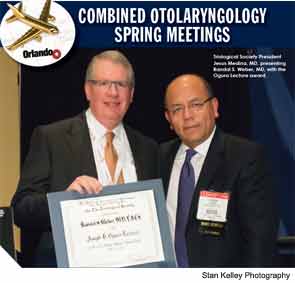Explore This Issue
May 2013
ORLANDO—Giving residents an earlier chance to explore early specialization in head and neck surgery during their residency might be one way to improve the educational system while helping to meet the demand for new surgeons in the discipline, said Randal S. Weber, MD, chair of the department of head and neck surgery at the University of Texas MD Anderson Cancer Center in Houston, as he delivered the Joseph H. Ogura Lecture here on April 12 at the 116th Annual Meeting of the Triological Society, held as part of the Combined Otolaryngology Spring Meetings. Click here to listen to the entire lecture.
In his lecture, entitled “Training Head and Neck Surgeons in the 21st Century: Is It Time for a New Paradigm?,” Dr. Weber said, “It’s time for a new look in how we educate.”
“There are two goals: We need to be able to place head and neck specialists into regional centers that are competent to deliver head and neck cancer care,” he said. “And we need to better prepare residents to enter fellowships followed by academic practice.”
Dr. Weber stressed that, although he is a director of the American Board of Otolaryngology and a member of the Residency Review Committee for the specialty, his comments represent his opinion and not those of either group.
Early specialization would help provide quality head and neck surgeons in both urban and rural settings, cut down or cut out training that doesn’t dovetail with a trainee’s goals and would make for a disease-focused approach in which surgeons could assume leading roles with care teams.
Care Quality
Dr. Weber’s proposal comes at a time when there’s an emphasis on higher quality care, a changing economic culture, a greater respect for a balance of lifestyle and career and an ever-expanding scope of knowledge, all of which make it more difficult to teach surgeons everything they need to know in the time they want to learn it.
Studies have found that the supply of quality head and neck surgeons might not keep up with demand, said Dr. Weber. New credentialing procedures and hospital privilege procedures will put more of an emphasis on performance, making the need for educational improvements even more glaring, he added.
“With the current educational model, we may not produce enough head and neck cancer specialists to meet the demand,” he said. “Surgical education is in evolution, both in how we teach and how we measure skill acquisition and competency.”
Leave a Reply